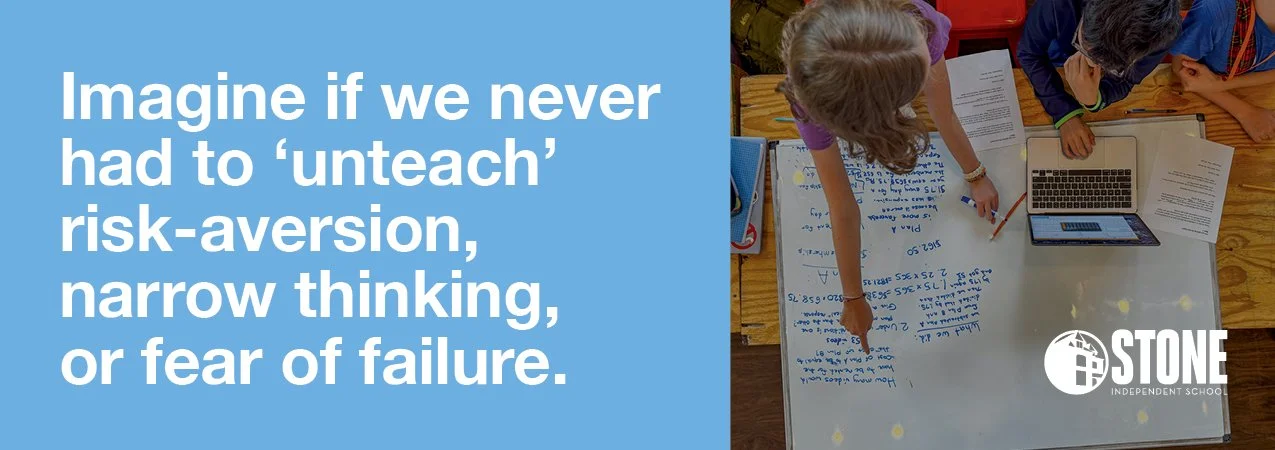Imagining Lower School at Stone: A Vision Becoming Reality
Imagine a school in Lancaster composed of truly independent thinkers, creative problem solvers, impactful contributors, and design thinkers. Imagine they are researching and then exhibiting their work to parents and peers and becoming masterful at receiving and offering feedback.
Now imagine this group of students is in kindergarten.
And: imagine how much more proficient they will be in these skills as fourth graders, and sixth graders, and 10th graders, and 12th graders. Imagine how they will stand out in a crowd of same-aged peers. Imagine how different they will look to a college admissions reader; to an employer; to an innovation team; to future patients and clients.
With the development of Stone’s Lower School program, that vision is becoming a reality and we are nothing short of ecstatic about the path ahead. For the first time, a seamless K-12 Stone education is possible, and there is no other school experience in Pennsylvania quite like it.
This has been our dream since founding Stone in 2016. At first, our dream was to “grow our own”: to teach students in a problem-based model from the start, so we never had to ‘unteach’ risk-aversion, narrow thinking, or fear of failure. However, as we witnessed the enormous growth students experienced in our 7-12 program, as we saw what was possible when a group of educators breaks away from a conventional model of schooling, as we found ourselves awestruck at the higher order thinking students present when the speed limit signs are removed, developing a K-6 program became an imperative: students of all ages should be able to learn this way.
At Stone, we prepare young people to expand their interests and skills, form an intellectual identity, seek challenges, and change the world. We hold fast to the belief that no challenge is too big for our students; the only question is how they will choose to approach it. Our curriculum invites learners to become co-architects of their intellectual journey, guided by nurturing instructors who use child-centered teaching, Socratic discussions, problem-based pedagogy, and frequent opportunities to practice, exhibit, and refine work. You can point out the Stone student in a college classroom: indeed, our students regularly catch the attention of their college professors, even in the first few weeks on campus.
And also, all children deserve a school they love, where they experience an education full of meaning – an education which takes time to develop big ideas, bold thinking, and confident students. While the details of our Lower School program will continue to evolve, they are firmly grounded in these guiding principles:
Education should be joyful, challenging, and rooted in curiosity. School is not a place to pause on passion until the textbook is closed; it is where children uncover their gifts.
Challenge and complexity are not obstacles but invitations, and children embrace them when supported in a nurturing environment.
Intentional design – of culture and curriculum – builds courage and capacity. Around Stone, you’ll often hear us say: everything is curricular, and the way we do anything is the way we do everything. Learning is constant, fluid, recursive, and not limited to 45 minute content blocks.
Children must learn to trust themselves, believe in their voices, and recognize the power of their agency as they make sense of the world.
Inquiry-based learning lays strong academic foundations while cultivating reflection, ownership, and responsibility for growth.
Growth mindset, emotional intelligence, and compassion aren’t extras: they’re essentials for the world our students will inherit.
Clear benchmarks for learning and ongoing, clear communication with parents make families true partners in this journey.
Every child deserves an active, social, and engaged learning experience.
A connection to the natural world – and to the rich biodiversity of Lancaster county – shapes both a sense of place and a sense of self.
The arts – vocal, performing, and visual – are central to developing creative problem-solvers, keen observers, and confident communicators.
Team sports and healthy competition grow resilience, empathy, and connection.
Partnerships with experts in diverse fields help children build aspiration, real-world understanding, and social capital, which we believe lie at the heart of a strong and involved citizenry.
A culture of feedback fosters authentic learning, while passive tasks do not.
Global perspectives and world language nurture empathy and humility.
Children thrive when they learn the connection between body and mind, when they practice healthy living and social-emotional self care.
A safe and peaceful community must welcome diverse perspectives and celebrate both commonalities and differences.
We are eager to offer more details about next steps for Lower School at Stone.
Stay connected to hear more.
In partnership,
Abby Kirchner
Assistant Head of School
Director of Education
Director of College Counseling
kirchnera@stoneindependent.org
